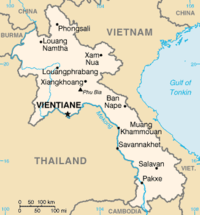Ten charged with plot to overthrow Laos government
Tuesday, June 5, 2007

Image: Siren-Com..
Ten people, including former Royal Lao Army general Vang Pao, 77, and a former United States Army officer Harrison Jack, 60, were arrested Monday in six different cities in California, USA after authorities with the Bureau of Alcohol, Tobacco, Firearms and Explosives (ATF), uncovered a plot to bring down the government of Laos.
Suspects were arrested in Chico, Fresno, Los Angeles, Sacramento, Stockton and Woodland.
The plot, said prosecutors, involved obtaining C-4 explosives, AK-47 rifles, rockets, land mines and Stinger missiles, which were to be shipped to Thailand, and then used to take down the main branch of the Laotian government by blowing up the government's main buildings in Vientiane, the capital of Laos.
The bombs would be deployed using "special operation mercenaries," but undercover agents working with the ATF foiled the plot when the suspects were tricked into buying the weapons and supplies they needed from the undercover agents. The government's investigation was dubbed "Operation Tarnished Eagle".
"These defendants had developed an audacious plan to overthrow the government of Laos, and were seeking to arm themselves with automatic rifles, rockets and surface-to-air missiles," said the assistant to the U.S. Attorney General, Kenneth Wainstein in a statement to the press.
"The individuals arrested today thought an arms dealer would provide the necessary weapons and personnel to assist them in the violent overthrow of another government. An undercover ATF agent led them to believe he could fulfill their needs," said acting ATF director Michael Sullivan in a statement to the press.
According to a criminal complaint filed in U.S. District Court, the plot was put together by a Lao liberation movement known as Neo Hom, led in the U.S. by Vang Pao, and had conducted extensive fund-raising activities, surveillance operations and an insurgent force within Laos.
Vang Pao led Hmong forces backed by the U.S. Central Intelligence Agency against the communist Pathet Lao in the "Secret War" in Laos in the 1960s and 1970s. He served in the Royal Army of Laos, holding the rank of major general. After the fall of Laos to the communists in 1975, Vang Pao immigrated to the U.S., where he is a folk hero among Laotian refugees. There were plans to name an elementary school after him in Wisconsin, which is home to many Hmong people.

Another man named in the charges, Jack, is a former California National Guard lieutenant colonel and a 1968 West Point graduate. He was involved in covert operations during the Vietnam War. Jack acted as an arms broker and organizer of the plot, according to the criminal complaint.
Most of the remaining suspects had fought in Laos with Vang Pao, the complaint said. Among those named in the complaint are seven prominent members of the Hmong community in California's Central Valley. They are:
- Lo Cha Thao, 34, of Clovis in Fresno County. Had worked as an aide to a former Wisconsin state senator.
- Lo Thao, 53, of Sacramento County, president of United Hmong International (also known as the Supreme Council of the Hmong 18 Clans).
- Youa True Vang, 60, of Fresno, founder of Fresno's Hmong International New Year.
- Hue Vang, 39, of Fresno, a former Clovis police officer. Director of United Lao Council for Peace, Freedom, and Reconstruction.
- Chong Yang Thao, 53, a Fresno chiropractor.
- Seng Vue, 68, of Fresno, member of United Hmong International.
- Chue Lo, 59, of Stockton, member of United Hmong International.
A tenth person arrested, but not yet charged, was Nhia Kao Vang of Rancho Cordova, California.
Laotian and Thai reaction
The Laotian government welcomed the arrests. "We praise the U.S. government as the group committed wrong doing against the Laos government which has good relations with the US," said Yong Chanthalangsy, Laotian Foreign Ministry spokesman.
Thailand, which was to be used as a transit country for the arms, said it would investigate the plot as well. "Thailand has a clear policy not to allow any party to use our territory as a lunching pad against our neighbors," said Tharit Charungvat, Thai Foreign Ministry spokesman.
In the past year, Thailand has had to deal with a stream of Hmong refugees, and has been forcibly repatriating them to Laos. Many of the refugees said they were associates of Secret War veterans and were fleeing from persecution. They hoped to follow other Hmong refugees to the West.
Laos spokesman Yong said the Hmong in Thailand were not fighters but victims of human traffickers, and that dissident groups had been long ago been suppressed in Laos. "The arrest of Vang Pao and his group might not have direct impact to Laos as we have nothing to do with them, but it would be a good news for Hmong minorities since the traffickers would have no excuse to lure them to Thailand to seek resettlement in the U.S. with Vang Pao," Yong said.
On Monday, Thai and Laotian officials met in Bangkok to discuss border security issues, and the two countries agreed to deport the Hmong in Thailand to Laos, Yong said.
Both Laos and Vietnam remain under communist governments. In 2005, the U.S. normalized trade agreements with Laos.
Sources
- Bangkok Post & agencies. "Vang Pao charged with Laos plot" — Bangkok Post, June 5, 2007
- Supalak Ganjanakhundee & Agence France-Presse. "Laos welcomes US' arrest of Hmong general" — The Nation (Thailand), June 5, 2007
- Adam Tanner. "U.S. arrests 10 it says plotted to oust Laos' govt" — Boston Globe, June 4, 2007
- "10 charged with alleged Laos plot" — CNN, June 4, 2007
External links
- DOJ/ATF/FBI Joint Press Release June 4, 2007 (PDF format)
- United States District Court - Complaint (PDF format)

